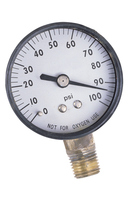Reduce that Pressure Part #2
Posted by Andrew Greess on Dec 2, 2014
Overpressurization can damage pest control power sprayers, Birchmeier backpack sprayers and B&G sprayers.
Here are some suggestions to help you reduce pressure-related pest control sprayer problems:

- Set a company policy for power sprayer operating pressure.
- Train techs to operate power sprayers at recommended pressure.
- Supervisors should check the operating pressure by observing technicians in the field or starting power sprayer as part of a regular vehicle inspection.
Overpressuring manual sprayers (such as backpack sprayers or 1-gallon compressed air sprayers) can damage these units. The most common problem we see is that when a manual sprayer has a problem, technicians will try to solve the problem by overpressuring the sprayer. This doesn’t solve the problem, it just inflicts more damage on the sprayer, which will now require more expensive repairs.
Another great way to reduce spray equipment problems is to release the pressure. Release the pressure on your (power or manual) sprayer after each stop to prevent problems. Release the pressure by squeezing the spray gun handle to let the pressure drop in the line. The power sprayer must be turned off and the manual sprayer must not be pumped up. If spraying extra chemical on the ground is a problem, open the lid of the sprayer tank and spray the product back into the tank.
Releasing the pressure on the sprayer extends the life of soft parts like hose, o-rings, gaskets, etc. We used to suggest releasing the pressure at the end of the day, but technicians forget and sprayers end up stored under pressure all night. Remember summer temperatures on the truck are higher than ambient, so the pressure in your system will increase if you don’t release the pressure.
Releasing the pressure also reduces the chance of freeze damage should a deep freeze occur. If the sprayer is stored under pressure and the temperature drops, there is nowhere for the water to expand. The weakest link in the system will break when the water freezes.
Train technicians to release pressure of all power and manual compressed air sprayers at the end of each stop to extend the life of your equipment and reduce breakdowns and downtime.

